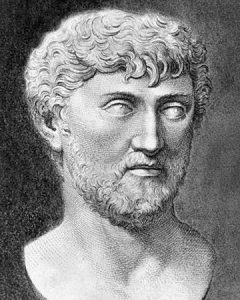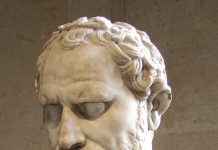The object of this study by Wake Forest University professor T. Gellar-Goad is the poem On the Nature of Things (De Rerum Natura) by Lucretius. It dates from around 60 BCE, making it roughly 2080 years old. While virtually all ancient Roman poetry is of interest only to classicists, this one is special. For it is here that atoms came of age.
We may be living in the Atomic Age (which began with the first atomic bomb blasts of the 1940s), but the atomic theory at the base of its understanding was reared by Lucretius. As Gellar-Goad (referred to hereafter as GG) writes, “De Rerum Natura supplies the first extant usages of elementum meaning ‘atom’ and therefore may be seen as the origin point for the transference of elementa from the alphabet to the material world.”
In his writing on atoms, Lucretius derides the notion of Anaxagoras (from the fifth century BCE) that components of matter are gifted with a self-similar nature. Thus, if wood is made of tiny particles of wood, humans are made of tiny particle-size humans. Lucretius pretends such particles exist, and writes what they think of Anaxagoras: “it’ll turn out that they guffaw, struck through with shaking laughter, and wet their faces and cheeks with witty tears.”
GG says this is the key to understanding the poem. “These nonexistent but compellingly human atoms offer the reader a model of how to respond to the text – with humor, with pleasure, with derision of wrong ways of thinking. They show us that to be effective readers of this poem is to think critically and to be critical and sarcastic all at once.” GG sees satire “surfing” through the poem, and it is through the study of satire in Roman poetry both before and after Lucretius that he expounds his critique throughout this fascinating book.
There are a host of densely reasoned (and compelling) arguments in this book, so in this review I will look at just a couple that deal with novel discoveries. GG finds a link, never before noted, between De Rerum Natura and two subsequent poems of great importance: the 12th poem of Juvenal, and the opening of the first satire by Horace. The poem by Juvenal features a merchant character Catullus. Until now scholars have interpreted the poem’s “predominant feature as irony.” The author discerns, however, that “Juvenal’s Catullus responds to troubles at sea in a fashion consistent with the moral recommendations of the Lucretian speaker.” He sees a very direct link from Lucretius to Juvenal: the “narrative extension of the sailing scene presented at the opening of Lucretius’ second book” is literally reenacted by Juvenal.
Horace picks up on the sailing troubles as well. In the poem by Lucretius, “the reader joins the speaker atop the fortress of philosophy, to look down on the shipwreck of a life that most people lead.” Here the speaker passes judgment “on the turbulent life of a sailor,” but in Horace “the point of view shifts to the sailor that the Lucretian speaker was observing.” In Horace, we get to hear the sailor’s voice on the same merchant ship that is in trouble, who says he would rather be a merchant, while the merchant wishes he were a soldier/sailor. Horace uses all this to satirise those who venture onto the waters for commercial gain: it is better stay on dry land if you are not greedy.
The author has applied his superior scholarship to reveal many such intertextual instances between various Roman poems (many satirical, and some only existing now as fragments) and the work of Lucretius. But no instance is more important than that of atoms, especially in the first satire of Horace, written a few decades after On the Nature of Things. Through Horace’s allusion to atoms as prima elementa, the Lucretian persona of his satire becomes a teacher “who teaches the prima elementa not of the alphabet but of the universe.” We now read the alphabet of the universe through a study of atoms and its even smaller constituents. The first photograph of a single atom was made in 1970.
As the author states, the poem by Lucretius “is a monument in the Roman tradition not only of philosophy but also of poetry.” As such, this insightful book, showing us for the first time how pervasive Lucretius’ satiric usage is, becomes an important one for a broad range of scholars from the history of physics to classicists and those who study the crucial role of poetry on the development of Western thought over the last two millennia.
There is a typo on pg 28, where the author is quoting from a book by Ralph Rosen: “seems to be the one”, not “seems to the one”
Lucretius’ De Rerum Natura and Satire ($85) is published by Univ. of Michigan Press.














